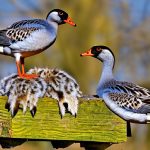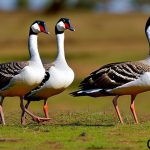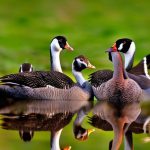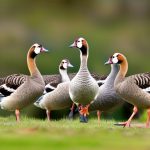Geese are fascinating creatures with complex social structures and behaviors. They are highly social animals that form strong bonds with their flock members. Geese are known for their honking calls, which they use to communicate with each other. They are also highly territorial and will defend their nesting sites and young from perceived threats. Geese are also known for their migratory habits, often traveling long distances in search of food and suitable nesting sites.
In addition to their social behaviors, geese are also known for their grazing habits. They are herbivores and primarily feed on grasses, grains, and aquatic plants. Geese are also known to be monogamous, often forming lifelong pair bonds with a mate. Understanding the behavior of geese is crucial for effectively managing them in a residential or commercial setting. By understanding their social structures, territorial instincts, and feeding habits, you can develop strategies to coexist with geese in a way that is mutually beneficial.
Creating a Suitable Living Environment for Geese
Creating a suitable living environment for geese is essential for their health and well-being. Geese require access to water for bathing and drinking, as well as ample grazing areas for feeding. If you have a pond or lake on your property, this can provide an ideal habitat for geese. However, it’s important to ensure that the water is clean and free of pollutants to prevent health issues for the geese.
In addition to water access, geese also require suitable nesting sites for breeding and raising their young. Providing nesting boxes or platforms near water sources can encourage geese to stay in a specific area and reduce the likelihood of them nesting in unwanted locations. It’s also important to provide shelter from predators and inclement weather, such as brush piles or artificial shelters. By creating a suitable living environment for geese, you can help ensure their well-being while minimizing potential conflicts with humans.
Implementing Effective Feeding Strategies
Implementing effective feeding strategies is crucial for managing geese in a residential or commercial setting. Geese are primarily herbivores and feed on grasses, grains, and aquatic plants. By managing the vegetation on your property, you can help control the food sources available to geese and reduce their presence in unwanted areas. For example, mowing grass to a shorter length can make it less appealing to geese, as they prefer longer grass for grazing.
In addition to managing vegetation, you can also implement feeding deterrents to discourage geese from congregating in specific areas. For example, using noise-making devices or visual deterrents can help deter geese from feeding in certain locations. It’s important to note that feeding deterrents should be used in conjunction with other management strategies, as geese may become habituated to them over time. By implementing effective feeding strategies, you can help reduce the presence of geese in unwanted areas while promoting their natural feeding behaviors in more suitable locations.
Training Geese to Respect Boundaries
Training geese to respect boundaries is an important aspect of managing their presence in a residential or commercial setting. Geese are highly territorial animals and will defend their nesting sites and young from perceived threats. By establishing clear boundaries and using visual or physical barriers, you can help deter geese from entering unwanted areas. For example, using fencing or netting around sensitive areas can help prevent geese from accessing them.
In addition to physical barriers, you can also use behavioral conditioning to train geese to respect boundaries. For example, using noise-making devices or motion-activated sprinklers can help deter geese from entering specific areas. It’s important to be consistent with these deterrents and reinforce the boundaries over time to effectively train geese to avoid certain locations. By training geese to respect boundaries, you can help minimize potential conflicts with humans while promoting coexistence in shared spaces.
Utilizing Natural Deterrents to Protect Your Lawn
Utilizing natural deterrents can be an effective way to protect your lawn from the presence of geese. Geese are attracted to lush, green grass for grazing, making lawns a common target for their feeding habits. By using natural deterrents, you can help discourage geese from congregating on your lawn without causing harm to the birds or the environment. For example, planting tall grasses or shrubs around the perimeter of your lawn can create a physical barrier that deters geese from entering the area.
In addition to physical barriers, you can also use natural scents or tastes to deter geese from feeding on your lawn. For example, applying non-toxic repellents with strong odors or tastes can make your lawn less appealing to geese. It’s important to use natural deterrents responsibly and in accordance with local regulations to ensure the safety of the environment and wildlife. By utilizing natural deterrents, you can help protect your lawn from the presence of geese while promoting a healthy and sustainable landscape.
Seeking Professional Advice for Geese Management
Seeking professional advice for geese management can be beneficial for developing effective strategies and solutions. Wildlife management professionals have the knowledge and experience to assess the specific needs of your property and develop customized management plans for managing geese. They can provide valuable insights into the behavior of geese and recommend appropriate management techniques based on your unique situation.
In addition to wildlife management professionals, local authorities or conservation organizations may offer resources and guidance for managing geese in your area. By seeking professional advice, you can gain access to valuable expertise and support for effectively managing the presence of geese while promoting coexistence in shared spaces.
Establishing a Routine for Lawn Maintenance and Geese Care
Establishing a routine for lawn maintenance and geese care is essential for promoting a healthy and sustainable environment. Regular lawn maintenance, such as mowing grass to a suitable length and managing vegetation around water sources, can help reduce the appeal of your property to geese. By establishing a routine for lawn maintenance, you can create an environment that is less attractive to geese while promoting a healthy landscape.
In addition to lawn maintenance, establishing a routine for geese care can help ensure their well-being while minimizing potential conflicts with humans. Providing access to clean water sources and suitable nesting sites can help encourage geese to stay in specific areas and reduce their presence in unwanted locations. By establishing a routine for lawn maintenance and geese care, you can promote coexistence with geese while maintaining a healthy and sustainable environment for all.
Meet Walter, the feathered-friend fanatic of Florida! Nestled in the sunshine state, Walter struts through life with his feathered companions, clucking his way to happiness. With a coop that’s fancier than a five-star hotel, he’s the Don Juan of the chicken world. When he’s not teaching his hens to do the cha-cha, you’ll find him in a heated debate with his prized rooster, Sir Clucks-a-Lot. Walter’s poultry passion is no yolk; he’s the sunny-side-up guy you never knew you needed in your flock of friends!







